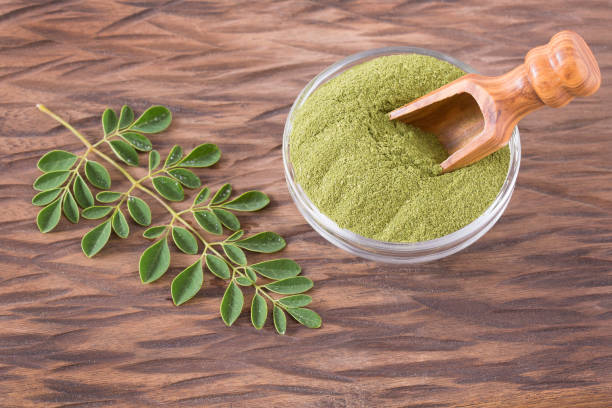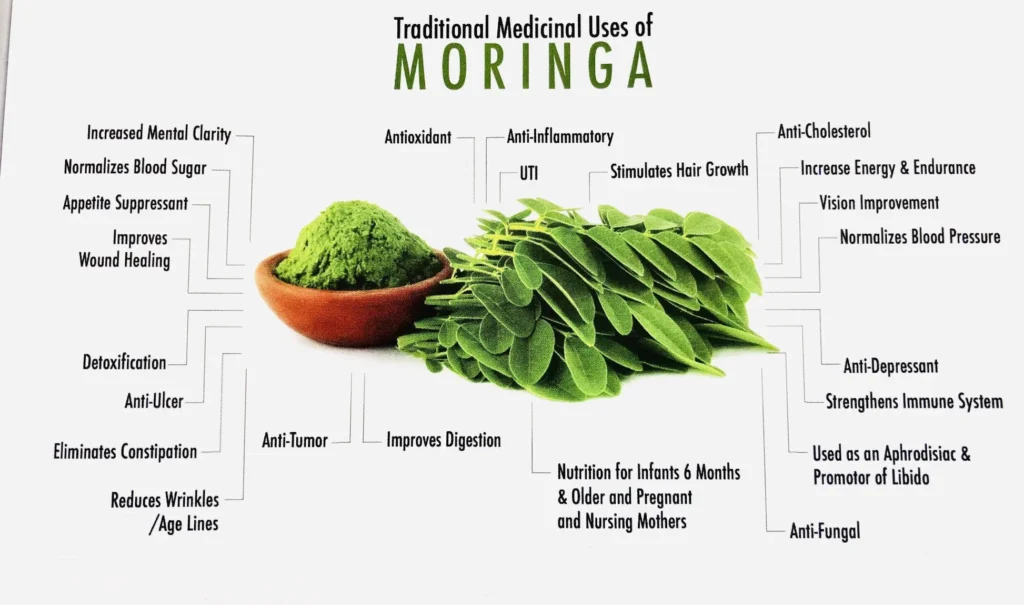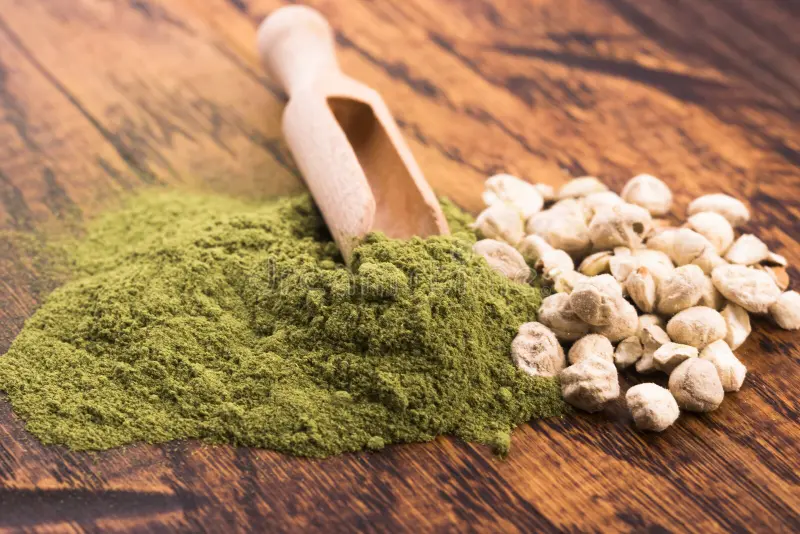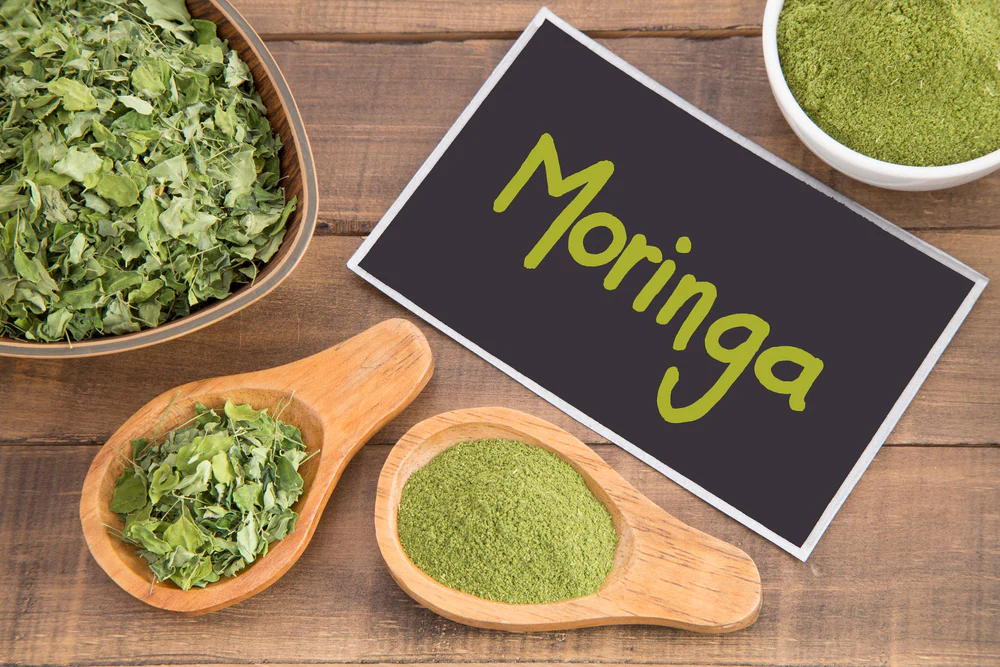In recent years, a green revolution has been quietly sweeping through the health and wellness industry, centered around a remarkable plant known as Moringa Oleifera. Often hailed as a miracle tree, Moringa has gained fame not only for its nutritional benefits but also for its potential to address food insecurity and support sustainable agriculture. This article delves into the wonders of Moringa, shedding light on its historical significance, nutritional profile, health benefits, and environmental impact.
Table of Contents
The Rise of Moringa
Historical Use
Moringa’s journey began centuries ago, with its roots deeply embedded in ancient cultures and traditional medicine. It has been used in India, Africa, and parts of Southeast Asia for thousands of years, not only as a dietary staple but also for its medicinal properties. Ancient civilizations recognized Moringa’s value in treating a variety of ailments, from inflammation and infections to heart problems and digestive disorders. Its ability to grow in harsh climates and poor soil made it invaluable for providing nutrition and medicinal benefits in resource-scarce regions.
Modern Discovery
The modern discovery of Moringa’s benefits has led to its designation as a “miracle tree.” Scientific research has begun to validate what traditional practices have known for centuries—that Moringa is a powerhouse of nutrients, antioxidants, and other bioactive compounds. Studies have highlighted its rich content of vitamins A, C, and E, calcium, potassium, and iron, alongside essential amino acids, making it one of the most nutrient-dense plants on the planet.
Nutritional Renaissance
Moringa’s rise in the global health community is part of a broader nutritional renaissance, where there’s an increasing shift towards natural, plant-based sources of nutrients. As people become more health-conscious and environmentally aware, the demand for sustainable, nutrient-rich food sources like Moringa has surged. Its versatility in food and cosmetic industries—ranging from Moringa-infused smoothies and supplements to skin care products—has further fueled its popularity.
Sustainable Impact
Beyond nutrition, Moringa’s rapid growth and ability to thrive in arid conditions make it a key player in sustainable agriculture and reforestation efforts. Its cultivation supports soil health, water conservation, and provides a sustainable livelihood for farmers in developing countries. The plant’s efficiency in sequestering carbon also positions it as a beneficial crop in the fight against climate change.
The Future of Moringa
The future of Moringa looks promising as research continues to explore its health benefits, environmental impact, and potential applications in food security. As awareness of its benefits grows, so does its potential to contribute to global health and environmental sustainability goals. The challenge remains in scaling its cultivation and use responsibly, ensuring that the Moringa revolution benefits not just the present but future generations as well.

Nutritional Profile
Vitamins and Minerals
Moringa leaves are a powerhouse of vitamins and minerals. They contain significant amounts of vitamin A, essential for healthy vision, immune function, and skin health. Vitamin C, abundant in Moringa, supports the immune system and acts as a powerful antioxidant. Vitamin E, also present, helps protect against oxidative stress and supports overall health.
The plant is also rich in minerals like calcium, which is vital for bone health; potassium, important for heart and muscle function; and iron, essential for the creation of red blood cells and oxygen transport. Magnesium, another mineral found in Moringa, plays a crucial role in over 300 enzymatic reactions, including energy production and DNA synthesis.
Antioxidants
Antioxidants are substances that can prevent or slow damage to cells caused by free radicals. Moringa is loaded with antioxidants, including quercetin, chlorogenic acid, and beta-carotene. Quercetin is known for its ability to lower blood pressure and inflammation, while chlorogenic acid, also found in high amounts in coffee, can help moderate blood sugar levels after meals. Beta-carotene, a precursor of vitamin A, is crucial for eye health and immune function.
Amino Acids
Amino acids are the building blocks of proteins, and proteins are the building blocks of all cells and tissues in the body. Moringa contains all nine essential amino acids, making it a rare plant-based source of complete protein. These amino acids include lysine, which is important for tissue growth and repair; tryptophan, which supports the production of serotonin, a neurotransmitter that regulates mood, sleep, and digestion; and methionine, which is important for detoxification and metabolism.
Fiber
Moringa leaves are a good source of fiber, which is essential for healthy digestion. Dietary fiber can help prevent constipation, promote gut health, and may contribute to weight management by creating a feeling of fullness, leading to reduced calorie intake.
Omega-3 Fatty Acids
While not as rich in omega-3 fatty acids as some other superfoods, Moringa leaves do contain alpha-linolenic acid (ALA), a type of plant-based omega-3 fat. Omega-3 fatty acids are crucial for heart health, reducing inflammation, and supporting brain function.
The Comprehensive Nutrient Content
The comprehensive nutrient content of Moringa makes it an excellent supplement for those looking to boost their nutrient intake naturally. Its rich array of vitamins, minerals, antioxidants, amino acids, and other beneficial compounds can support a wide range of health benefits, from enhanced immunity and reduced inflammation to improved energy levels and better overall well-being.

Health Benefits
Immune System Support
Moringa is packed with vitamins A and C, both of which are crucial for the maintenance and enhancement of the immune system. Vitamin A is essential for cellular immune responses and maintaining the integrity of mucosal membranes, while vitamin C helps stimulate the production and function of white blood cells. Together, these nutrients help the body ward off infections and illnesses.
Energy Levels and Metabolism Boost
Thanks to its high vitamin B content, Moringa can significantly boost energy levels. B vitamins play a vital role in converting food into energy, optimizing the efficiency of metabolism. The plant’s iron and magnesium content also contribute to reducing fatigue and enhancing overall vitality, making Moringa an excellent supplement for those looking to maintain energy throughout the day.
Antioxidant Benefits
Moringa’s rich antioxidant content, including quercetin, chlorogenic acid, and beta-carotene, helps fight free radicals in the body. This action not only reduces oxidative stress but also may lower the risk of chronic diseases such as heart disease and type 2 diabetes. Antioxidants also play a role in aging healthily, promoting skin health by combating the effects of aging.
Anti-inflammatory Properties
Inflammation is a natural response to infection or injury, but chronic inflammation can lead to several health issues, including heart disease and cancer. Moringa contains isothiocyanates, which are known for their anti-inflammatory properties, helping to reduce inflammation and the associated health risks.
Heart Health
The antioxidant properties of Moringa may benefit heart health by preventing the oxidation of cholesterol in the bloodstream, which can lead to heart disease. Its niaziminin compounds also help prevent the thickening of arterial walls, reducing the risk of hypertension and heart disease.
Diabetes Control
Moringa has been found to help in regulating blood sugar levels, making it beneficial for people with diabetes. The plant’s chlorogenic acid helps to moderate blood sugar levels after meals, while its high fiber content can help to ensure sugar is released into the bloodstream more slowly.
Digestive Health
Moringa is rich in fiber, which aids in the smooth functioning of the digestive system. Fiber can help prevent constipation, promote regularity, and contribute to a healthy digestive tract. Additionally, its antibacterial properties can combat certain pathogens and contribute to gut health.
Bone Health
Rich in calcium and phosphorus, Moringa helps to support the development and maintenance of healthy bones. The anti-inflammatory and antioxidant properties also contribute to reducing inflammation and oxidative stress in bones, potentially reducing the risk of osteoporosis.
Skin and Hair Health
Moringa’s high antioxidant content not only supports internal health but also benefits the skin and hair. Vitamins A and E, along with antioxidants, help in fighting signs of aging, supporting skin health, and promoting hair growth and health by delivering essential minerals and vitamins.
Weight Management
Moringa can play a role in weight management efforts due to its low-calorie content and high nutrient density. This combination can help reduce cravings and support a feeling of fullness, aiding in weight loss or maintenance.

Environmental Benefits
Sustainable Farming Practices
Moringa is a resilient plant that can grow in poor soil conditions with minimal water, making it an ideal crop for arid and semiarid regions. Its ability to thrive in challenging environments reduces the need for chemical fertilizers and irrigation, promoting more sustainable farming practices. Moringa’s fast growth rate also means it can be harvested several times a year, providing continuous benefits without depleting resources.
Soil Health and Erosion Control
The deep root system of the Moringa tree helps in preventing soil erosion, an important factor in maintaining healthy topsoil and preventing desertification. Its roots can also help improve soil quality by aerating the soil and enhancing nutrient cycling. By integrating Moringa into agricultural systems, farmers can improve soil health and fertility, leading to better crop yields and sustainable land use.
Water Conservation
Given its drought-resistant nature, Moringa plays a crucial role in water conservation. It can produce biomass and leaves without the extensive water requirements of many other crops. This characteristic makes Moringa an invaluable resource in regions where water scarcity is a pressing issue, allowing for the cultivation of nutritious food without straining limited water supplies.
Carbon Sequestration
Moringa trees have the potential to sequester carbon, contributing to the mitigation of climate change. Through the process of photosynthesis, Moringa trees absorb carbon dioxide from the atmosphere, storing carbon in their biomass and the soil. By planting Moringa, communities can contribute to reducing the concentration of greenhouse gases in the atmosphere, thereby combating global warming.
Biodiversity Enhancement
The cultivation of Moringa can enhance biodiversity in agricultural systems. Its flowers attract pollinators such as bees and butterflies, which are essential for the pollination of many crops and wild plants. Additionally, Moringa plantations can provide habitat and food sources for a variety of birds and insects, supporting ecosystem health and resilience.
Sustainable Livelihoods
Moringa cultivation offers economic benefits to rural communities through the creation of sustainable livelihoods. The various parts of the Moringa tree — leaves, seeds, oil, and bark — have commercial value, providing income opportunities for farmers and entrepreneurs. The global demand for Moringa products can drive economic development in rural areas, reducing poverty and promoting social stability.
Reduction of Greenhouse Gases
By providing a renewable source of biomass for fuel, Moringa can help reduce reliance on fossil fuels and deforestation for firewood. Moringa oil, extracted from its seeds, can be used as a biofuel, offering a cleaner, sustainable energy source that emits fewer greenhouse gases compared to traditional fossil fuels.
Waste Reduction
Moringa cultivation and processing produce minimal waste, as almost every part of the plant can be used for nutritional, medicinal, or industrial purposes. This efficiency helps reduce waste and promotes a more sustainable use of resources.

How to Incorporate Moringa
Dietary Incorporation
- Moringa Powder: One of the simplest ways to consume Moringa is in powder form. Moringa leaves are dried and ground into a fine powder that can be added to smoothies, juices, or teas. The powder can also be sprinkled over salads, soups, and pastas for a nutritional boost.
- Moringa Tea: Moringa leaves can be steeped in hot water to make a nutritious tea. Available both in loose leaf and teabag forms, Moringa tea is a calming way to enjoy the plant’s benefits. You can enhance the flavor with honey, lemon, or mint according to your preference.
- Cooking with Moringa Leaves: Fresh or dried Moringa leaves can be used similarly to spinach or kale in recipes. They can be sautéed, added to stews, soups, and curries, or used in salads. The leaves have a mild flavor, making them a versatile ingredient in a wide range of dishes.
- Moringa Seeds and Oil: Moringa seeds can be eaten like nuts or used to extract oil. Moringa oil, also known as Ben oil, is high in monounsaturated fats and can be used for cooking or in salad dressings. The seeds have a slightly spicy flavor and can be roasted or added to dishes for extra crunch.
- Moringa Capsules: For those looking for a convenient way to consume Moringa, capsules are available. They provide a straightforward method to incorporate Moringa into your daily routine, especially for individuals who are always on the move.
Lifestyle Incorporation
- Skincare Products: Moringa oil is a fantastic moisturizer and can be found in a variety of skincare products, including creams, serums, and body oils. Its antioxidants and healthy fats make it beneficial for skin health, helping to reduce inflammation, moisturize, and protect the skin from damage.
- Hair Care: Moringa oil is also used in hair care products, such as shampoos and conditioners, for its nourishing properties. It can help strengthen hair, promote scalp health, and enhance shine.
- Gardening: Growing a Moringa tree in your garden or community space can provide a direct source of its leaves, seeds, and oil, while also contributing to environmental sustainability. Moringa is relatively easy to grow in tropical and subtropical climates and can even be cultivated in pots in cooler regions, provided it receives enough sunlight.
- Sustainable Living: Incorporating Moringa into your lifestyle can also mean supporting sustainable agriculture and fair trade practices. By choosing Moringa products from sources that prioritize environmental sustainability and fair compensation for farmers, you contribute to a more ethical and sustainable global food system.
The Future of Moringa
Increased Research and Innovation
The body of research surrounding Moringa is growing, but there is still much to explore about its potential benefits and applications. Future studies are likely to delve deeper into its medicinal properties, with a focus on understanding how its various compounds interact with human biology to prevent and treat diseases. Additionally, innovation in processing and product development can expand Moringa’s market presence, making it more accessible to consumers worldwide in various forms, from nutritional supplements to skincare products and beyond.
Scaling Up Sustainable Agriculture
Moringa’s role in sustainable agriculture is set to increase, particularly in arid and semiarid regions where water scarcity and soil degradation pose significant challenges to food production. By integrating Moringa into agricultural systems, communities can improve soil health, conserve water, and enhance biodiversity. This shift towards more sustainable practices can help ensure food security and livelihoods in vulnerable regions, contributing to the global fight against hunger and poverty.
Addressing Climate Change
Moringa’s capacity for carbon sequestration and its minimal requirements for water and fertilizers position it as an ally in the fight against climate change. Large-scale cultivation of Moringa can aid in carbon offsetting efforts while providing a sustainable source of nutrition and income. Moreover, its use as a biofuel offers a cleaner alternative to fossil fuels, reducing greenhouse gas emissions and promoting renewable energy sources.
Global Health Impact
The nutritional benefits of Moringa have the potential to make a significant impact on global health, particularly in regions suffering from malnutrition and micronutrient deficiencies. Its high content of vitamins, minerals, and protein can help address dietary gaps, improving health outcomes and reducing mortality rates, especially among children and pregnant women. As awareness of Moringa’s health benefits continues to spread, its integration into global health programs and policies could become more prevalent.
Economic Development and Empowerment
Moringa cultivation and processing present economic opportunities for rural communities, offering a source of income and promoting economic development. As the global demand for Moringa products grows, so does the potential for job creation and entrepreneurial ventures. Empowering farmers and small businesses through Moringa production can help uplift communities, reduce poverty, and encourage self-sufficiency.
Challenges and Considerations
Despite its potential, the future of Moringa is not without challenges. Sustainable cultivation practices must be prioritized to prevent overexploitation and ensure the long-term viability of Moringa resources. Additionally, regulatory frameworks and quality standards will be crucial in safeguarding the safety and efficacy of Moringa products in the market.
Conclusion
The Moringa revolution represents a convergence of nutrition, health, and environmental sustainability. As research continues to uncover its potential, Moringa stands not just as a superfood but as a beacon of hope for sustainable health solutions.
FAQs
- What makes Moringa a superfood? Moringa is considered a superfood due to its rich nutritional profile, including a high concentration of vitamins, minerals, antioxidants, and all nine essential amino acids.
- Can Moringa help in weight loss? Yes, Moringa can support weight management efforts due to its low-calorie content and high nutrient density, which may help reduce cravings and increase feelings of fullness.
- Is Moringa safe for everyone to consume? While Moringa is safe for most people, individuals with specific health conditions or those taking certain medications should consult a healthcare provider before adding it to their diet.
- How can I add Moringa to my diet? Moringa can be added to the diet in various forms, such as powder, capsules, or fresh leaves, and used in smoothies, teas, and dishes.
- What are the environmental benefits of Moringa cultivation? Moringa contributes to sustainable agriculture through its low water requirements, ability to grow in poor soil conditions, and potential to prevent soil erosion.



MOST COMMENTED
Animal-Based Proteins / Casein Protein / Dietary Protein / High-Protein Diets / Pea Protein / Plant-Based Proteins / Protein / Protein Deficiency / Protein Supplements / Proteins / Whey Protein / Whey Proteins
Is Protein Powder Safe for Teenagers and Children?
Animal-Based Proteins / Casein Protein / Dietary Protein / High-Protein Diets / Pea Protein / Plant-Based Proteins / Protein / Protein Deficiency / Protein Supplements / Proteins / Whey Protein / Whey Proteins
Unlock the Power of Proteins for Optimal Gut Health
Multivitamin
Total Health: Multivitamin for Active Lifestyles
Multivitamin
WellnessFusion: Complete Multivitamin Support
Dietary Supplement
Revitalize Your Health: The Magic of Red Yeast Rice Capsules
Foot care / Foot Health
Revitalize Your Foot Care Routine: Essential Tips for Optimal Foot Health
Foot Problem / Diabetics / Foot Health
Diabetics: Mastering Footwear Selection for Enhanced Foot Health and Ultimate Comfort
Exercises and Footwear Tips for Hammertoe Relief / Foot care / Foot Health / Foot Pain / Foot Problem / Hammertoes
Unlock Effective Exercises and Footwear Tips for Hammertoe Relief
Hammertoes / Foot Health / Foot Pain / Foot Problem
Unlock Relief: Essential Guide to Hammertoes Causes, Symptoms, and Treatments
Foot Problem / Foot Health
Revolutionize Your Recovery: Natural Remedies for Plantar Fasciitis – Fresh Home Keepers